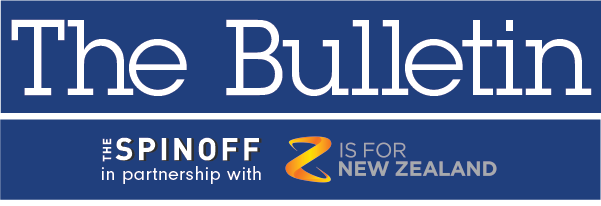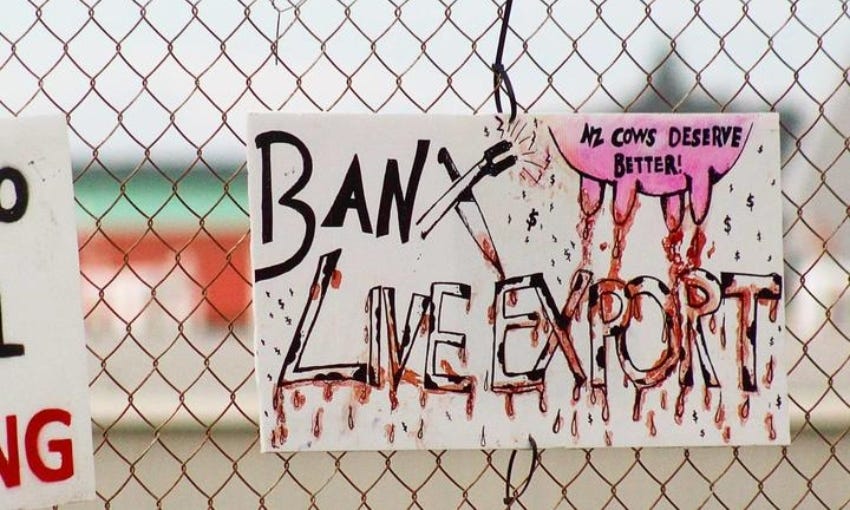Live animal export ban on the way
The trade is considered cruel by animal rights activists, but farmers don't agree
Good morning and welcome to The Bulletin for Wednesday 14 April, by Alex Braae for The Spinoff. Presented in partnership with Z Energy.
In today’s edition: Live animal export ban on the way, New Zealand’s emissions increase again, and SkyCity cracking down on money laundering junkets.
Image: A protest sign at a demonstration in Taranaki (Radio NZ, Robin Martin)
Live animal exports are set to be banned by the government, bringing an end to a controversial agricultural practice. The story was reported by One News last night, with an understanding that an announcement will take place this week – this indication has also been given to other media. There was a detail included that "it's also believed the Government delivered a letter to the Chinese Embassy on March 31 signalling the move will be taking place." If true, this is a significant detail, because tens of thousands of live cattle go there every year, with the number spiking recently. At the time of writing, there was a fascinating interview on Morning Report with an exporter and vet, who said he’d had a tipoff that the ban was coming, which he thought was a terrible idea – keep an eye on their website for that being posted.
The trade is lucrative, but many argue it is clearly and flagrantly cruel towards the animals. A temporary ban was put in place after a ship capsized last year, resulting in the tragic loss of life of dozens of workers and thousands of cattle. When the ban was lifted, tighter conditions were put in place, but animal rights activists continued to call for a permanent ban. Those protests have continued ever since – Charlie O'Mannin of the Timaru Herald reported on a particularly fractious rally at the docks, with some Timaru locals making their feelings on the protesters felt rather vocally. The conditions the animals endure on the voyages – and particularly their fates at the other end – are often arduous and painful.
The decision is likely to go down poorly with farmers. In March, the industry defended itself in a Radio NZ story, with one exporter arguing that treating the animals well made economic sense too. The approach the industry wanted to see was one of "continued improvement" on animal welfare, rather than a ban, which raised warnings about cutting off an important income stream for some farmers.
New figures show New Zealand's emissions increased by 2% in the year to the end of 2019. The Guardian reports the increase "was predominantly driven by the energy sector and an increase in methanol production in the manufacturing industries," sitting on top of high existing emissions in transport and agriculture. Climate minister James Shaw agreed that the increase was a bad sign, but also argued that it didn't take into account emissions reductions policies in the last year. Which may be the case, but to put it in context, Politik (paywalled) takes a longer view and reports "the increase makes a mockery of New Zealand’s greenhouse gas reduction targets and means the country has missed every emissions reduction target set by the previous Government by massive amounts."
SkyCity is cracking down on 'junkets' – VIP travel trips to casinos – after money laundering findings in Australian casinos. The NBR's (soft paywall) Andrew Bevin reports that investigation found seven operators with links to organised crime, two of which also did business with SkyCity. The casino said they made the decision on their own steam, having not had any contact from Internal Affairs on the matter. The practice has become much less common since Covid closed the borders.
The Spinoff can’t exist without our members. If you want to help us stay curious and keep our team across New Zealand’s breaking stories, please donate today.
There has been an increasing amount of chatter over the last few weeks regarding the National Party leadership. The NZ Herald's Claire Trevett has been reporting low-key talks are understood to be taking place within the party over a potential Simon Bridges/Christopher Luxon ticket. The latest update is that Bridges has been pointedly not giving unequivocal answers to questions on the speculation – make of that what you will. Is it going to go down this time? Nobody really knows, and opposition leaders often have to deal with this sort of background noise, though Judith Collins hasn't shifted the polls at all since the election. Meanwhile, the party released a policy this morning to incentivise councils to consent new houses, to the tune of $50k a pop, reports Stuff.
New offences will be created around planning and preparing terrorist attacks, reports Thomas Manch for Stuff. Justice minister Kris Faafoi said the crackdown on 'precurser' activity will "close a gap" in the existing law around terrorism offences. The law changes would also give significant new warrantless search powers to police, if they considered it that such a search was necessary without delay. Only Act leader David Seymour has come out against the law changes so far, saying it was a "smokescreen" to cover the fact that government agencies failed to prevent the March 15 attacks, rather than a failure of existing laws.
An story of ingenuity from the vaccine rollout: Stuff's Cate Broughton reports on a Canterbury DHB nurse who ended up with a mysterious surplus of more than a thousand doses, with no plan as to how they'd be distributed. So she just put a call out on social media for people to come and get their jabs – hundreds did, preventing the vaccine from going to waste. Meanwhile Radio NZ's Rowan Quinn reports on fears that Auckland has only half the number of vaccinators that will be needed for the rollout.
The government has ruled out overhauling the Misuse of Drugs Act, with health minister Andrew Little citing last year's cannabis referendum as a reason not to. It comes after a wide coalition of NGOs and activists made the call to change the law to an explicitly health-based system. Writing on The Spinoff, journalist and activist Russell Brown has described the position as "absurd", saying it doesn't make sense in either the context of international climate of drug reform, or in the context of the situation in New Zealand.
Well-deserved awards for some scientists who had had a remarkable year: The 2020 Prime Minister's Science Prize has gone to research organisation Te Pūnaha Matatini, for their rapid response work in the early days of Covid. In a release, it was outlined how the team did the sort of technical modelling work that allowed the government to make decisions with the best possible information, and without them the country's response might have ended up very differently. Otago epidemiologist Dr Michael Baker was awarded the 2020 Science Communication Prize.
A brand new video series to check out: You may have heard of The Spinoff's article series The Single Object, which looks at huge moments and pivotal movements in history through the lens of an artefact that tells the story. Now it's on screen, and looks gorgeous. The first episode is about a chainsaw, wielded by Māori activist Mike Smith on the lone pine at Maungakiekie / One Tree Hill.
Got some feedback about The Bulletin, or anything in the news?
Drop us a line at thebulletin@thespinoff.co.nz
Right now on The Spinoff: Danyl Mclauchlan has a wonderful new review of a major climate change book, and does something of a lit survey of that field right now. Robyn Hunt writes about the loneliness epidemic in the disability community. Russell Brown writes about moves made by Kiwibank to protect problem gamblers from their impulses. Broadcasting minister Kris Faafoi joins media podcast The Fold, and at one point has the bravery to tell host Duncan Greive that he might be overthinking things – phenomenal stuff from the minister. Sam Brooks made the case that video gaming peaked at the turn of the century. And comedian Janaye Henry is on a theatre tour of Aotearoa teaching teens about sex, and is writing us a non-Tourism NZ-approved diary of her travels – her first column is from Ōtepoti Dunedin.
For a feature today, a prediction about the present, from the past. Someone sent me this Wired article from 1997, which predicted that the next 25 years would basically bring "prosperity, freedom, and a better environment for the whole world". I'll leave judgements about the accuracy of the predictions up to you, but what really stood out to me was the novelty of seeing such unbridled optimism. Here's an excerpt:
A spirit of generosity returns. The vast majority of Americans who see their prospects rising with the expanding economy are genuinely sympathetic to the plight of those left behind. This kinder, gentler humanitarian urge is bolstered by a cold, hard fact. The bigger the network, the better. The more people in the network, the better for everyone. Wiring half a town is only marginally useful. If the entire town has phones, then the system really sings. Every person, every business, every organization directly benefits from a system in which you can pick up a phone and reach every individual rather than just a scattered few.
That same principle holds true for the new networked computer technologies. It pays to get everyone tied into the new information grid. By 2000, this mentality sinks in. Almost everyone understands we're deep into a transition to a networked economy, a networked society. It makes sense to get everyone on board.
Reports out of Australia indicate Manchester United could be on the verge of buying a struggling A-League club. Dominic Bossi reports for the SMH that the Central Coast Mariners could be bought and moved to Sydney, and in the process become a 'sister club' for United. This sort of arrangement has precedent – Melbourne City are owned by Manchester City, who have a network of clubs around the world. Any deal would need to be signed off by both Football Australia, and a majority of existing A-League clubs.
That's it for The Bulletin. If you want to support the work we do at The Spinoff, please check out our membership programme.







